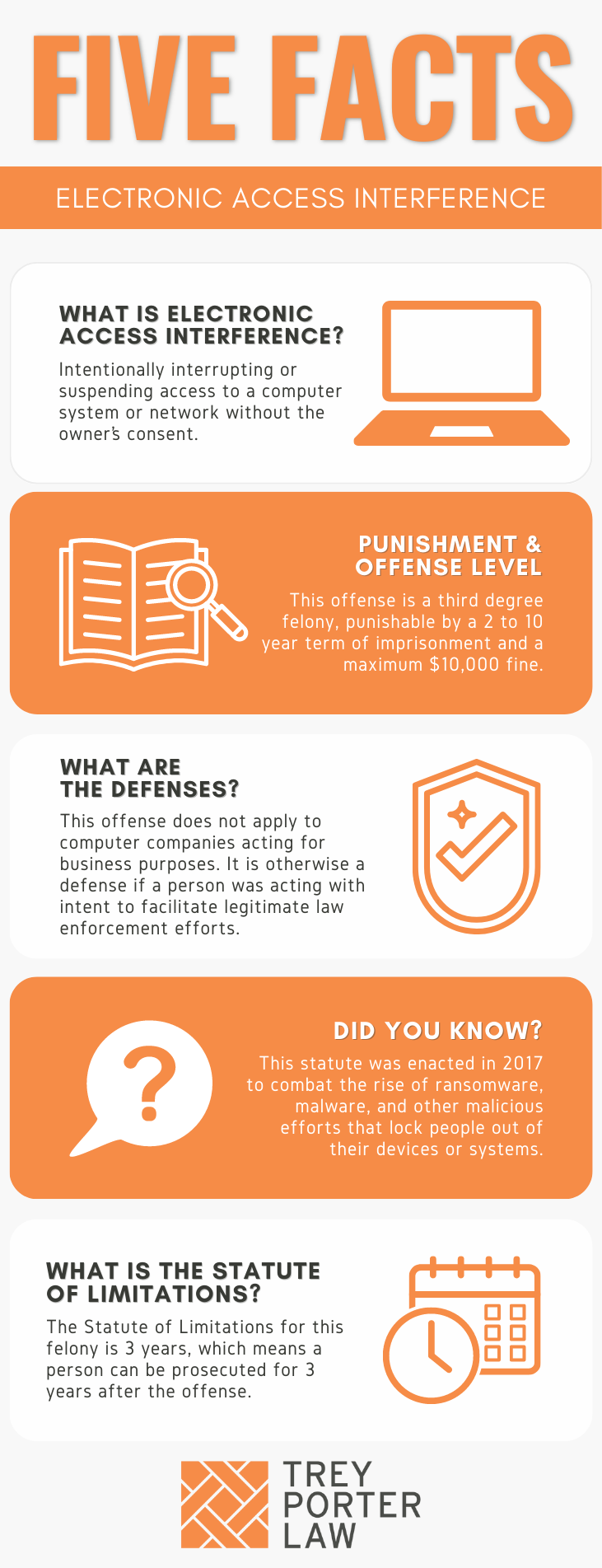WHAT IS ELECTRONIC ACCESS INTERFERENCE IN TEXAS?
The Texas law against electronic access interference prohibits intentionally interrupting or suspending access to another’s computer system or network without permission, unless done so for a legitimate business purpose.

WHAT IS THE ELECTRONIC ACCESS INTERFERENCE LAW IN TEXAS?
Tex. Penal Code § 33.022. ELECTRONIC ACCESS INTERFERENCE.
(a) A person, other than a network provider or online service provider acting for a legitimate business purpose, commits an offense if the person intentionally interrupts or suspends access to a computer system or computer network without the effective consent of the owner.
(b) An offense under this section is a third degree felony.
(c) It is a defense to prosecution under this section that the person acted with the intent to facilitate a lawful seizure or search of, or lawful access to, a computer, computer network, or computer system for a legitimate law enforcement purpose.
Tex. Penal Code § 33.03. DEFENSES.
It is an affirmative defense to prosecution under Section 33.02 or 33.022 that the actor was an officer, employee, or agent of a communication common carrier or electric utility and committed the proscribed act or acts in the course of employment while engaged in an activity that is a necessary incident to the rendition of service or to the protection of the rights or property of the communication common carrier or electric utility.
WHAT IS THE PENALTY CLASS FOR ELECTRONIC ACCESS INTERFERENCE IN TEXAS?
Electronic access interference is a third degree felony, punishable by two to ten years in prison.
WHAT IS THE PUNISHMENT RANGE FOR ELECTRONIC ACCESS INTERFERENCE IN TEXAS?
The punishment range for electronic access interference, a third degree felony, is two to ten years in prison, and a maximum $10,000 fine.
WHAT ARE THE PENALTIES FOR ELECTRONIC ACCESS INTERFERENCE IN TEXAS?
A person charged with electronic access interference may be eligible for probation after a conviction for a term between two and five years, or deferred adjudication without a conviction for up to ten years.
WHAT ARE THE DEFENSES TO ELECTRONIC ACCESS INTERFERENCE IN TEXAS?
The statute authorizes a defense to electronic access interference if the person was acting with intent to facilitate lawful access to a computer, computer network, or computer system for a legitimate law enforcement purpose.
It is also an affirmative defense to electronic access interference if the person was an officer, employee, or agent of a communication common carrier or electric utility, and committed the alleged interference:
- in the course of employment; and
- the activity was necessary to:
- render services; or
- protect the rights or property of the communication common carrier or electric utility.
WHAT IS THE STATUTE OF LIMITATIONS FOR ELECTRONIC ACCESS INTERFERENCE IN TEXAS?
The limitation period for electronic access interference is three years.
ELECTRONIC ACCESS INTERFERENCE IN TEXAS
The Texas Legislature enacted the law against electronic access interference in 2017 in response to modern cybercrimes. Using ransomware, malware, and other methods to lock people out of their devices, for example, is now a third degree felony in Texas.
















